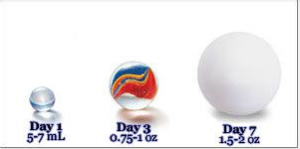There are many myths out there surrounding breastfeeding. Some myths are passed down through generations, some specific to certain cultures, and of course, from mama-to-mama experience. Another factor is that with constant research being undertaken for greater evidence in pregnancy related areas, what we once did, may not be of best practice or recommended anymore. So here are some common questions/myths and their answers/debunking.
Q: It’s a hot day, so I’ll give my baby (<6months) a bottle of water?
A: No your little bubba does not need a bottle of water. Breastmilk has 2 parts (once the milk is in). Firstly when the baby latches it will suck more intensely and quickly…this is when the baby is getting foremilk, a thin, thirst quenching milk. When the baby switches rhythms and begins slower, more nutritive sucking, bub is receiving the hindmilk (a fattier, densely nutritious, calorie fuelled milk). So on a hot day, you might find your baby feeds more frequently and for short amounts of time…this is because baby is requiring the thirst quenching milk. Make sure you keep your own fluids up!
Q: I’ve got small boobs, so does that mean I don’t produce as much milk as someone with big boobs?
A: Breast size doesn’t affect milk production in the majority of women, this is because breast tissue is for the most part connective tissue and fatty tissue rather than milk producing glands. The amount of milk produced is connected to how often, how well and for how long bub feeds.
Q: My mother didn’t make much milk, so I won’t either:
A: Since your mum has had babies, a lot has changed. We now strongly encourage skin-to-skin immediately after birth (no washing of bub beforehand) and mother-infant bonding as well as rooming in with your baby. Complimentary feeds are not as frequent as they once were and many hospitals are striving for BFHI (Baby Friendly Hospital Initiative) accreditation which encourages breastfeeding and its benefits, and only utilising formula if there is a medical indication or maternal request.
Q: (Day 1) I don’t have enough milk:
A: When your baby is born and before your milk comes in around day 3-4, you have colostrum – a gold coloured, sticky fluid that your body has been making and storing since you were 16 weeks pregnant. Colostrum is not only gold in colour, it is liquid gold! It is densely rich in your antibodies, calories, protein and has a laxative effect (helping to push out the meconium, the black sticky poo, stimulating baby’s tummy) to make more room for breastmilk. You make the perfect amount of breastmilk for your baby. Colostrum is the initial breastmilk, and is of a lower volume than foremilk and hindmilk, however it is the perfect amount for your baby’s tiny tummy, at that point in time (see the image at the bottom of article).
Q: Formula fed babes are better sleepers than breastfed babes:
A: Formula and breastmilk have a difference composition and different protein molecules. Formula has larger protein molecules, meaning that it takes the baby longer to process and metabolise…sitting in their tummy longer…keeping them fuller for longer. Research has shown that though formula fed babies may sleep for longer periods than breastfed babies, their sleep quality is not of a better quality.
Breastfed babies begin to sleep for longer periods from around 4-6 weeks and it is at this time that their sleep duration seems to equate to that of a formula-fed bub.
FYI – Why babies don’t need a crazy amount of breastmilk on Day 1, and why they want to feed constantly in the days to come is explained perfectly in this picture below. Babies have tiny tummies, and breastmilk is metabolised very easily and quickly…hence their frequent feeding. Babies also feed frequently because they’re clever and know this brings the milk in quicker, especially at night time in the early days. You breastmilk producing hormone, Prolactin, is highest at night…and babies know it…hence why they sleep more soundly during the day and are crazily feeding throughout the night. Hang in there – they won’t be possessed, breastmilk crazy night monsters for too long!

Reference:
Saggy Boobs and Other Breastfeeding Myths 2008. Scotland. (This is an evidence based book that doesn’t take itself too seriously. An interesting read for mama’s wanting more info and more myths debunked!)

